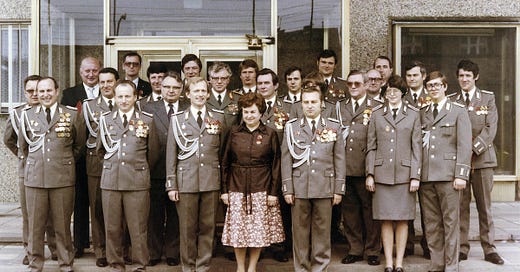When the state turns families into watchdogs: a warning from history
A new German initiative to report loved ones for “conspiracy thinking” raises troubling historical echoes. Are we witnesses to the return of an unthinkable past?
I lived in Iran in 2005, in the shadow of a period of relative openness under the reformist presidency of Mohammad Khatami. The people I met, even those too young to remember life immediately post-revolution, still bore deep scars formed by decades of state surveillance.
Life in Tehran felt quasi-normal at that time, but beneath the surface lay an unsettling reality for the people I knew: a distrust, even of their own family members. One of the most striking experiences I remember was hearing about my colleague’s uncle, who reported a family gathering to the religious police because things were getting a bit too boisterous. It was a chilling reminder of how authoritarian regimes create an environment where trust evaporates and personal relationships become instruments of control.
That awkward memory — of family members reporting family members to the authorities — resurfaced recently, while reading Didi Rankovic’s story on Reclaim the Net about a new German initiative, the Advice Compass on Conspiracy Thinking. The program was announced on February 27 and is spearheaded by the country’s Interior Ministry. It urges citizens to report family members suspected of engaging in so-called “conspiracy theories” via an anonymous hotline and online portal. Interior Minister, Nancy Faeser, justifies it as part of a broader strategy to combat extremism and disinformation.
(As an aside, it’s worth remembering we’re talking about Germany. Yes, the very country that just 80 years ago went down a similar road with opposition parties, gypsies, jews, gays and their sympathizers. The country which, when partitioned post-World War II, was also home to the infamous Stasi in the East — where 1 in 3 citizens were informants. More on East Germany in a bit.)
Regardless of Faeser’s intentions, history offers numerous cautionary tales about what happens when governments encourage individuals to monitor and report on their loved ones. Authoritarian regimes throughout the 20th century — from Maoist China to post-revolution Iran and Communist East Germany — normalized betrayal in the name of ideological purity.
During China’s Cultural Revolution, Mao Zedong relied not just on the state’s repressive apparatus but on the destruction of familial trust. Parents, siblings, and spouses turned on each other to prove loyalty to the Party. Fang Zhongmou, a once-loyal Communist Party member, was publicly executed in 1970 after her own husband and son denounced her for criticizing Mao. Children were taught through youth groups like the Red Guard to report their parents for ideological deviance. By the time the Cultural Revolution ended, millions had been persecuted, many at the hands of their own kin.
Similarly, in the aftermath of Iran’s 1979 revolution, theocratic rule transformed personal relationships into potential liabilities. The newly established Basij militia encouraged people to report family members for un-Islamic behavior. Stories circulated about sons turning fathers in for criticizing the regime or daughters being reported for attending clandestine poetry readings. Failing to inform could make an entire family guilty, leading to their collective punishment.
Perhaps the most systematic example of this phenomenon was East Germany’s Stasi, one of history’s most notorious secret police forces. By the late 1980s, the Stasi had recruited approximately 189,000 informants — many of whom were coerced into spying on their own friends and family.
In her book, Stasiland, author Anna Funder explores what life was like in the most perfected surveillance state of all time.
The Stasi was the internal army by which the government kept control. Its job was to know everything about everyone, using any means it chose. It knew who your visitors were, it knew whom you telephoned, and it knew if your wife slept around. It was a bureaucracy metastasised [sic] through East German society: overt or covert, there was someone reporting to the Stasi on their fellows and friends in every school, every factory, every apartment block, every pub.
It might seem extreme to compare Germany’s Advice Compass program to these historical examples, but the underlying concern remains the same: the normalizing of ideological policing within private relationships. Sure, Germany’s initiative doesn’t rely on coercion or punishment — there are no forced informants, no labor camps, no secret police — but the very act of encouraging citizens to monitor and report their family members’ beliefs and behaviors sets a dangerous precedent.
The German government claims this initiative is meant to combat the spread of ‘disinformation’ that threatens democracy. But who decides what disinformation is? What we accept as truth or fiction is constantly shifting and being externally manipulated. Ideas once dismissed as fringe or conspiratorial have often proven themselves to be truth. When the state positions itself as the arbiter of ‘fact’ and enlists citizens to enforce ideological conformity, the potential for abuse is immense.
History demonstrates these types of programs rarely stay static. In fact, once in place they tend to expand. Today, the Advice Compass merely provides ‘recommendations.’ But what happens when reporting someone leads to follow-ups by intervention centers or legal consequences for persistent dissent? What safeguards exist to ensure this doesn’t become a gateway to more invasive state interference?
In the past, the surveillance state’s Achilles heel was the fallibility of humans. After all, a missing file folder, manila envelope or dossier on a dissident could have meant the difference between re-education camp or another day to roam the streets. Now, electronic data collection coupled with artificial intelligence ensures nothing will ever slip through the cracks again.
The most successful totalitarian regimes didn’t begin with mass imprisonments — they began by reshaping the role of family. When people can no longer freely express their thoughts in the privacy of their own home without fear of being reported, the breakdown of social cohesion soon follows.
Germany’s initiative may seem benign on the surface — a mere advisory program meant to curb dangerous radicalization. But as history has repeatedly shown, even the smallest intrusions into private life have a way of escalating. Simply suggesting that individuals should monitor their loved ones for ideological transgressions plants a seed of mistrust that, once established, is difficult to uproot. If vigilance against state overreach is paranoia, then history suggests paranoia is sometimes necessary to preserve a free society.






Your article is absolutely chilling in my view. It's a testament to how close we are to unbelievable cruelty and degradation. History should have taught us not to go down this road of ultimate betrayal.
Part of the globalist agenda is to break up the family, our support groups, friends and loved ones. It seems to me they've managed to erode our basic human decency and instincts for cooperation and love. I remember growing up without fear in the 60's, except for the cuban missile crises. I would never dream of turning in family members no matter how mean and wrong they were. We learned about the holocaust, WW2, and were rightly afraid.
But kids today don't seem to know this history, or maybe don't care. They've been targeted by the corporations, schools, media and tech companies for profit, and now in the post covid era, for the more devious goal of surveillance, manipulation and control. They use sophisticated mind control and behavioral modification to weaponize basic human empathy and the basic need for support and companionship.
When the critical thinkers die off and few can remember the atrocities of the recent past, and the digital control grid is put in place.. God help us all.
Thank you for your clarity and wisdom on this topic.
This is exactly the sort of phenomena that Vice-President J. D. Vance was warning the Europeans about in his recent speech to the U.K. and E.U. countries at the Munich Security Conference where he pointed out their censoring of political and religious speech. I can only imagine their shock at having their ideology utterly destroyed right in front of their faces. Later some of these people spoke out against Mr. Vance's tastefully done tongue lashing but the damage to them had been done for all the world to see. I personally reveled in it. The U.K. and the E.U. are in a free fall politically, spiritually AND financially.